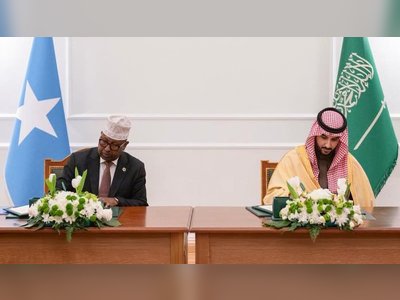
Ehud Barak: Iran Can Transform Itself into a Nuclear Power - And It's Too Late to Stop It By Surgical Attack
Iran is close to becoming a nuclear state and military action will no longer be effective in stopping the Islamic Republic's nuclear program, former prime minister Ehud Barak warned this week. Barak made the assessment in a column he penned for Time Magazine in which he argued that while attacks can be carried out, they are unlikely to succeed in delaying the program.
Barack’s column:
The effort to block Iran from turning into a nuclear power is at its lowest ebb ever, apparently headed for failure. In 2015, the U.S.-led agreement to delay Iran’s program failed to go far enough, and the 2018 U.S. withdrawal from that same agreement allowed Iran to ‘legitimize’ its persistent crawl toward ’threshold nuclear’ status – that is, having enough highly enriched uranium for one nuclear device and the technology to make it a weapon. In 2018 they were some 17 months away from that threshold. Today they are probably just 17 days away.
It’s time to face reality.
It was for good reason that, eight months ago, U.S. Secretary of State Antony Blinken said that if an agreement is not achieved within weeks it might not be worth signing. That’s even more true today. Iran kept enriching uranium and has turned from a country that Russia was assigned to monitor into a country supplying Russia with armed drones. At this point, a new agreement would be useful mainly for appearances, providing both sides a ‘denial umbrella’ for domestic needs — for the U.S., avoiding tougher realities and choices, and, for the Iranians, keeping sanctions at the lightest level possible.
This summer, Iran will turn into a de-facto threshold nuclear state. Yes, it will still take them from 18 to 24 months to polish their skills treating metal uranium and packing it into a missile warhead. But these steps can be executed in a small lab or workshop and cannot be easily followed, never mind stopped. It may well be that, even if and when Iran becomes a nuclear threshold country, the mullahs will opt to pretend otherwise, remaining in the Non-Proliferation Treaty (NPT) regime in order to avoid even heavier sanctions. But that will not change the reality. After more than 20 years of trying, Iran is about to cross the point of no return in becoming a member of the “nuclear club.”
This has been the mullahs’ ambition all along.
They have successfully followed in the footsteps of North Korea and Pakistan, who defied the whole world and turned nuclear. They also avoided the coerced end of the Libyan and South African nuclear programs, and the fate of the Iraqi and Syrian programs, destroyed by Israeli surgical air raids in 1981 and 2007 respectively.
But in 1981 and 2007, those programs weren’t as advanced as the Iran’s program had been allowed to become.
For unexplainable reasons, after the US pulled out of the Joint Comprehensive Plan of Action in 2018 neither the US nor Israel prepared an available military ‘plan B,’ a kinetic attack capable of delaying the Iranian program by at least several years.
But while this was probably achievable when Iran was 17 months away from successful “breakout,” the situation is totally different at 17 days. “Breakout” is shorthand for the decision, followed by action, to shift a nominally civilian nuclear program, one devoted to generating electrical power, to a program making weapons. It involves enriching uranium 238 isotope to over 90% purity. The enrichment is done in centrifuges and the process of raising it from 60% to ‘weapon grade’ is much faster and simpler than the earlier processes. This last stage requires smaller spaces, possibly in very deep tunnels beyond the reach of any weapon. So even if you have excellent intelligence (which is not always the case) and you know in real time what is happening, you might find that you can’t do a lot about it. It already has happened to the US, more than once, regarding North Korea.
So the reality is this: Both Israel and (for sure) the US can operate over the skies of Iran against this or that site or installation and destroy it. But once Iran is a de-facto threshold nuclear state this kind of attack simply cannot delay the Iranians from turning nuclear. Indeed, under certain circumstances it might accelerate their rush toward assembling that bomb, and provide them a measure of legitimacy on grounds of self-defense.
In other words, unlike the surgical operations that were considered 12 years ago, or could have been considered 4 years ago–operations which could have substantially delayed the Iranian program (while risking a war with Iran)–the present possibilities bring all the risk of war (especially for Israel) with only scant likelihood of delaying the Iranian nuclear program.
The US can still deter Iran from going nuclear by a diplomatic ultimatum to stop the program, backed by credible threat of a wide scale war. Nothing short of that can assure a result. I hope this is still realistic.
Otherwise, we face a new and severe change for the worse in the security balance of the Middle East. Iran is already a tough and bitter rival, operating against Israel and others, directly and by proxies in Iraq, in Syria, Lebanon, and Yemen, while spreading terror, chaos and insurgency wherever they can. I would not for a moment underestimate their capacity to harass Israel and others, disrupt normal life, or their wish to see Israel defeated.
However, when it comes to nuclear capability, bear in mind that creating a preliminary nuclear arsenal can take a decade or more. It becomes a potential existential threat to Israel only in the longer term. Realistically speaking it’s not about dropping a weapon on Israel. The Iranian mullahs are fanatics and extremist but not stupid or crazy. They do not want to end up back in the Stone Age.
Quite the opposite. For Iran, nuclear capability is about the survivability of the regime. It assures that no one will dare to intervene on a wide scale in Iran, no matter how vulnerable the regime appears. Nuclear capability will also ‘balance’ their positioning vis-a-vis Israel and give the Iranians more freedom to sow conflicts and disorder all over the region.
The more realistic risk, first and foremost, is the potential collapse of the NPT regime. If Iran chooses to go nuclear–a decision that the Iranian regime alone will make–Turkey, Egypt and in a different way Saudi Arabia will all feel compelled to go nuclear as well. That might take a decade or more, and probably only two will succeed, but a possible collapse of the NPT regime will encourage every third-rate dictator on earth to try protecting his regime the same way. What’s more, the road might open for the nightmare scenario, described by Harvard’s Graham Allison in Nuclear Terrorism, which holds that the more nuclear states there are, the greater the risk of a crude nuclear device in the hands of a terrorist group.
So, what is to be done? First, look reality at the eye, and act upon it – not on wishes or delusions. Start to think and prepare for the real new phase.
If a new agreement with Iran, even a dubious one, helps preserve the NPT, that would still serve useful purposes. But Iran’s signature is less important than what the U.S. does. Washington must establish a small club of relevant states, Israel among them, and make sure that high investments in intelligence minimizes the risk of missing any crucial developments. A lot should be done with operational and diplomatic cooperation, from covert ops to public policy, to prepare much tougher sanctions as well as operational contingencies to be activated if or when Iran appears to rush towards assembling a weapon – that is, when it breaks out.
Israel should also be equipped with the means to enable it to carry out an independent attack on the nuclear program, if both governments are convinced it is absolutely necessary. The smaller partner should have this capability because actual breakout will most probably occur when the US is engrossed with a crisis elsewhere, be it Venezuela, the South China Sea islands, Taiwan, Ukraine or an interregnum.
Special attention should be given to convincing Turkey, Egypt, Saudi Arabia and others in the region that they are properly protected against Iranian nuclear blackmail and need not turn nuclear themselves.
The Ayatollahs are not going to control Iran forever. Usually such revolutions tend to collapse in their third generation (see the Communist Revolution, among other cases). Iran’s extremely young society will approach this stage within the next two decades. The Iranian people are a great people and great civilization from the dawn of history. They were Israel’s best friends in the region just 45 years ago. We have to stand firm and contain the Iranian Islamic Republic. At certain point, hopefully sooner than later, they will collapse and a new chapter will be opened. Let’s work together towards it.
The effort to block Iran from turning into a nuclear power is at its lowest ebb ever, apparently headed for failure. In 2015, the U.S.-led agreement to delay Iran’s program failed to go far enough, and the 2018 U.S. withdrawal from that same agreement allowed Iran to ‘legitimize’ its persistent crawl toward ’threshold nuclear’ status – that is, having enough highly enriched uranium for one nuclear device and the technology to make it a weapon. In 2018 they were some 17 months away from that threshold. Today they are probably just 17 days away.
It’s time to face reality.
It was for good reason that, eight months ago, U.S. Secretary of State Antony Blinken said that if an agreement is not achieved within weeks it might not be worth signing. That’s even more true today. Iran kept enriching uranium and has turned from a country that Russia was assigned to monitor into a country supplying Russia with armed drones. At this point, a new agreement would be useful mainly for appearances, providing both sides a ‘denial umbrella’ for domestic needs — for the U.S., avoiding tougher realities and choices, and, for the Iranians, keeping sanctions at the lightest level possible.
This summer, Iran will turn into a de-facto threshold nuclear state. Yes, it will still take them from 18 to 24 months to polish their skills treating metal uranium and packing it into a missile warhead. But these steps can be executed in a small lab or workshop and cannot be easily followed, never mind stopped. It may well be that, even if and when Iran becomes a nuclear threshold country, the mullahs will opt to pretend otherwise, remaining in the Non-Proliferation Treaty (NPT) regime in order to avoid even heavier sanctions. But that will not change the reality. After more than 20 years of trying, Iran is about to cross the point of no return in becoming a member of the “nuclear club.”
This has been the mullahs’ ambition all along.
They have successfully followed in the footsteps of North Korea and Pakistan, who defied the whole world and turned nuclear. They also avoided the coerced end of the Libyan and South African nuclear programs, and the fate of the Iraqi and Syrian programs, destroyed by Israeli surgical air raids in 1981 and 2007 respectively.
But in 1981 and 2007, those programs weren’t as advanced as the Iran’s program had been allowed to become.
For unexplainable reasons, after the US pulled out of the Joint Comprehensive Plan of Action in 2018 neither the US nor Israel prepared an available military ‘plan B,’ a kinetic attack capable of delaying the Iranian program by at least several years.
But while this was probably achievable when Iran was 17 months away from successful “breakout,” the situation is totally different at 17 days. “Breakout” is shorthand for the decision, followed by action, to shift a nominally civilian nuclear program, one devoted to generating electrical power, to a program making weapons. It involves enriching uranium 238 isotope to over 90% purity. The enrichment is done in centrifuges and the process of raising it from 60% to ‘weapon grade’ is much faster and simpler than the earlier processes. This last stage requires smaller spaces, possibly in very deep tunnels beyond the reach of any weapon. So even if you have excellent intelligence (which is not always the case) and you know in real time what is happening, you might find that you can’t do a lot about it. It already has happened to the US, more than once, regarding North Korea.
So the reality is this: Both Israel and (for sure) the US can operate over the skies of Iran against this or that site or installation and destroy it. But once Iran is a de-facto threshold nuclear state this kind of attack simply cannot delay the Iranians from turning nuclear. Indeed, under certain circumstances it might accelerate their rush toward assembling that bomb, and provide them a measure of legitimacy on grounds of self-defense.
In other words, unlike the surgical operations that were considered 12 years ago, or could have been considered 4 years ago–operations which could have substantially delayed the Iranian program (while risking a war with Iran)–the present possibilities bring all the risk of war (especially for Israel) with only scant likelihood of delaying the Iranian nuclear program.
The US can still deter Iran from going nuclear by a diplomatic ultimatum to stop the program, backed by credible threat of a wide scale war. Nothing short of that can assure a result. I hope this is still realistic.
Otherwise, we face a new and severe change for the worse in the security balance of the Middle East. Iran is already a tough and bitter rival, operating against Israel and others, directly and by proxies in Iraq, in Syria, Lebanon, and Yemen, while spreading terror, chaos and insurgency wherever they can. I would not for a moment underestimate their capacity to harass Israel and others, disrupt normal life, or their wish to see Israel defeated.
However, when it comes to nuclear capability, bear in mind that creating a preliminary nuclear arsenal can take a decade or more. It becomes a potential existential threat to Israel only in the longer term. Realistically speaking it’s not about dropping a weapon on Israel. The Iranian mullahs are fanatics and extremist but not stupid or crazy. They do not want to end up back in the Stone Age.
Quite the opposite. For Iran, nuclear capability is about the survivability of the regime. It assures that no one will dare to intervene on a wide scale in Iran, no matter how vulnerable the regime appears. Nuclear capability will also ‘balance’ their positioning vis-a-vis Israel and give the Iranians more freedom to sow conflicts and disorder all over the region.
The more realistic risk, first and foremost, is the potential collapse of the NPT regime. If Iran chooses to go nuclear–a decision that the Iranian regime alone will make–Turkey, Egypt and in a different way Saudi Arabia will all feel compelled to go nuclear as well. That might take a decade or more, and probably only two will succeed, but a possible collapse of the NPT regime will encourage every third-rate dictator on earth to try protecting his regime the same way. What’s more, the road might open for the nightmare scenario, described by Harvard’s Graham Allison in Nuclear Terrorism, which holds that the more nuclear states there are, the greater the risk of a crude nuclear device in the hands of a terrorist group.
So, what is to be done? First, look reality at the eye, and act upon it – not on wishes or delusions. Start to think and prepare for the real new phase.
If a new agreement with Iran, even a dubious one, helps preserve the NPT, that would still serve useful purposes. But Iran’s signature is less important than what the U.S. does. Washington must establish a small club of relevant states, Israel among them, and make sure that high investments in intelligence minimizes the risk of missing any crucial developments. A lot should be done with operational and diplomatic cooperation, from covert ops to public policy, to prepare much tougher sanctions as well as operational contingencies to be activated if or when Iran appears to rush towards assembling a weapon – that is, when it breaks out.
Israel should also be equipped with the means to enable it to carry out an independent attack on the nuclear program, if both governments are convinced it is absolutely necessary. The smaller partner should have this capability because actual breakout will most probably occur when the US is engrossed with a crisis elsewhere, be it Venezuela, the South China Sea islands, Taiwan, Ukraine or an interregnum.
Special attention should be given to convincing Turkey, Egypt, Saudi Arabia and others in the region that they are properly protected against Iranian nuclear blackmail and need not turn nuclear themselves.
The Ayatollahs are not going to control Iran forever. Usually such revolutions tend to collapse in their third generation (see the Communist Revolution, among other cases). Iran’s extremely young society will approach this stage within the next two decades. The Iranian people are a great people and great civilization from the dawn of history. They were Israel’s best friends in the region just 45 years ago. We have to stand firm and contain the Iranian Islamic Republic. At certain point, hopefully sooner than later, they will collapse and a new chapter will be opened. Let’s work together towards it.











